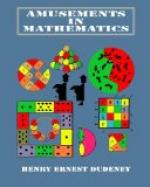One of the prisoners, after working at the problem for two or three days, with a piece of chalk, undertook to obtain the liberty of himself and his fellow-prisoners if they would follow his directions and move through the doorway from cell to cell in the order in which he should call out their numbers.
[Illustration]
He succeeded in his attempt, and, what is more remarkable, it would seem from the account of his method recorded in the ancient manuscript lying before me, that he did so in the fewest possible moves. The reader is asked to show what these moves were.
404.—THE SIBERIAN DUNGEONS.
[Illustration]
The above is a trustworthy plan of a certain Russian prison in Siberia. All the cells are numbered, and the prisoners are numbered the same as the cells they occupy. The prison diet is so fattening that these political prisoners are in perpetual fear lest, should their pardon arrive, they might not be able to squeeze themselves through the narrow doorways and get out. And of course it would be an unreasonable thing to ask any government to pull down the walls of a prison just to liberate the prisoners, however innocent they might be. Therefore these men take all the healthy exercise they can in order to retard their increasing obesity, and one of their recreations will serve to furnish us with the following puzzle.
Show, in the fewest possible moves, how the sixteen men may form themselves into a magic square, so that the numbers on their backs shall add up the same in each of the four columns, four rows, and two diagonals without two prisoners having been at any time in the same cell together. I had better say, for the information of those who have not yet been made acquainted with these places, that it is a peculiarity of prisons that you are not allowed to go outside their walls. Any prisoner may go any distance that is possible in a single move.
405.—CARD MAGIC SQUARES.
[Illustration]
Take an ordinary pack of cards and throw out the twelve court cards. Now, with nine of the remainder (different suits are of no consequence) form the above magic square. It will be seen that the pips add up fifteen in every row in every column, and in each of the two long diagonals. The puzzle is with the remaining cards (without disturbing this arrangement) to form three more such magic squares, so that each of the four shall add up to a different sum. There will, of course, be four cards in the reduced pack that will not be used. These four may be any that you choose. It is not a difficult puzzle, but requires just a little thought.
406.—THE EIGHTEEN DOMINOES.




